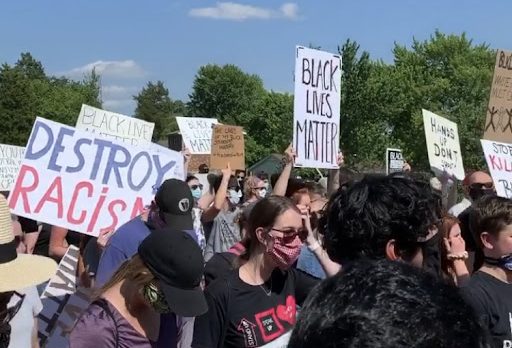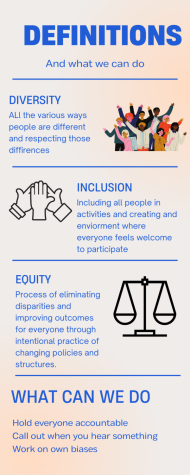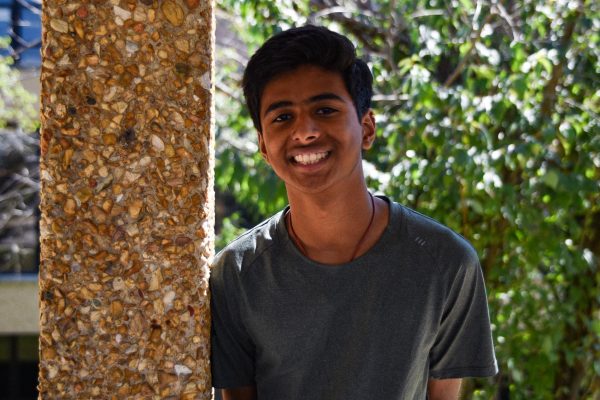
Two summers ago, an announcement from Superintendent Dr. Keith Marty concerning racism and hate speech in social media posts announced the formation of the Equity Task Force. The task force’s purpose was to develop strategic plans and action steps based on an equity evaluation to promote diversity and inclusion and ensure equity for all at Parkway.┬а
The task force led by Dr. Charlotte Ijei, the district’s Pupil Personnel and Diversity Directorimplemented a тАЬWhole School JusticeтАЭ program in 2003, requiring faculty and staff to participate in social justice training. The program increased the number of African American students in AP and honors classes and decreased suspension rates. Parkway won a 2018 National School Board Association Diversity Award for its efforts to narrow achievement gaps.
тАЬWe’ve been doing diversity [work] at Parkway for several years. When I first came to Parkway, I noticed a lot of inequities, and that was in 1996,тАЭ Ijei said. тАЬWe started doing social justice awareness training at that time. So fast forward, we’ve been through all these years. We know that we still have inequities in Parkway, and this would be a perfect time to do a targeted evaluation.тАЭ┬а
Equity evaluation starting in 2019 was done based on surveys of students from grades 5-12, parents and staff, and small group discussions were completed in June of 2020, resulting in nine recommendations to the district. Subsequently, the Equity Task Force was formed with 61 members, comprising students, board members, teachers, counselors, principals, parents, police officers, elected officials, district administrators and clergy. The members met once a month from August 2020 to May 2021 and created detailed action steps for each of the nine recommendations submitted in the Equity Task Force Board Report 2021 to the Board of Education.
тАЬWe knew we had gaps. We knew we had some students who identify differently than the majority of students, and they were being targeted,тАЭ Ijei said. тАЬThe task force’s goal was to look at different areas to see why are we having these issues and why aren’t all of our students feeling they belong and what we can do about it.тАЭ┬а
The first of the nine recommendations call on hiring and retaining staff that mirrors the diversity of the student population. The second recommendation is to empower teachers and staff to build relationships with all students. One of the action steps implemented for this recommendation is collaborating with Dr. Sharroky Hollie, an expert in training educators on culturally and linguistically responsive teaching.
тАЬYou have to get to know your students, know their background, know their culture to accept them and get to know them better to build that positive, sustainable relationship with every student,тАЭ Ijei said.┬а
Assistant Principal Dr. Kate Piffel served on the committee for the third recommendation and the incoming principal, John McCabe, and a few other students and administrators. They worked on developing action plans for the third recommendation to support and develop administrators to lead equity initiatives in their buildings.
тАЬI think we are further along now than when I started in Parkway eight years ago, but we still have a way to go. I am also still learning and have a lot of work to do myself,тАЭ Piffel said. тАЬIt’s like voting. If you want to make a difference, you have to pay attention and use your voice, speak up, and be willing to share your thoughts and opinions. Not everyone is always going to agree with you. But if you can have discussions respectfully and listen to each other, you can have good conversations and get things accomplished.тАЭ
Recommendation four is to initiate mandatory professional development for all employees to increase their understanding of systemic and institutionalized racism and oppressions that cause inequities.┬а
тАЬIt starts with understanding the vocabulary. I quote Verna MeyerтАЩs definition of diversity, inclusion, and equity from her Ted Talk on overcoming bias. Diversity is inviting someone that doesnтАЩt look like you to a party. Equity is making sure that someone doesn’t stand on the wall and has space at the party. But inclusion is inviting the person to dance or to add to the music list,тАЭ Ijei said.
The fifth recommendation is to implement a system of accountability that will measure the progress of the equity initiatives at the district, building, and classroom levels. Students on the task force played a significant role by helping create policies and potential solutions. However, every student in the district can accelerate equity efforts by reporting issues they see and by holding everyone accountable, according to Ijei.
тАЬIf you see something happening that shouldnтАЩt be happening, we want to know, and we will look at it,тАЭ Ijei said. тАЬ[Students are] our eyes and ears. Who do you see not being treated fairly and equitably? Call out friends who are not being nice to someone just because of the color of their skin or because of their religion or their political preference, or anything different than what the other believes. No one should be made to feel as if they do not belong.тАЭ
Revising the curriculum so that students can see themselves depicted accurately in classroom instruction and resources is recommendation number six.┬а
тАЬWe’re looking at the curriculum in terms of what does the curriculum say about me? If I belong to a particular religion, say, for example, Judaism or represent a group such as the LGBTQ community, what does [the curriculum] have to make me feel as if I am a part of this whole educational process?тАЭ Ijei said.

The following recommendation is to increase all teachers’ knowledge of how to engage students in courageous conversations about racism and other oppressions. According to Ijei, one of the most significant accomplishments of the task force is that it opened many eyes to issues of race, diversity, and inclusion and opened the door to discussions on topics which she says are usually hard to talk about for people.
тАЬI love working with the students because they’re intelligent, and they’re right there on the pulse of what’s going on. They know what it is,тАЭ Ijei said. тАЬI like working with our staff and faculty simply because they want to learn and do better. They want to understand their biases. We all have biases, and we have to get in touch with them and bring them to the forefront so we can eventually wipe them out.тАЭ┬а
The incident of racial graffiti in the bathroom of Central High last year that sparked media attention and student protests is not the only incident Ijei has seen over the years. Although, she notes that the occurrence of race-related incidents has decreased since┬а the diversity and equity work began.
тАЬIt’s not the first incident. I think [there is] a microcosm of people in the community that’s been allowed to say and do [anything] they want to. And this is adults as well as kids hurting people and putting people in a bubble,тАЭ Ijei said. тАЬFor instance, people started calling the coronavirus the Chinavirus. That’s unconscionable because it’s not about China or people from China. We cannot judge a whole group of people by one act or by one person.тАЭ
Parkway exercises zero tolerance for racism and hate speech, and students found responsible can receive severe disciplinary consequences, though Ijei believes education is the most important part of the process.┬а
тАЬThey [students] aren’t doing it because they’re racist. They’re doing it because it’s just something that seems okay to do. Once they get it, they change, and they, in turn, become the largest group of advocates ever,тАЭ Ijei said. тАЬIt’s not about putting kids out of school or disciplining them, as it is getting them to know the person they harmed and about the groups they harmed.тАЭ┬а
The eighth recommendation is to involve parents and community members in the work of equity. The final recommendation is to engage students who are members of the district-wide Superintendent Social Justice Leadership Advisory Council (SSJLAC) and other equity groups within their buildings to increase learning, acceptance, conversations and student voice at all levels. U.S. History teacher and Department Chair Zaven Nalbandian leads the SSJLAC which meets monthly. In addition, senior Brinda Ambal served as a student member of the task force and reported to the SSJLAC.
тАЬWe had to read suggested material, watch TED Talks, and then discuss how we want it to reflect our goals and values. That’s why it took us [the task force] a year to form these action plans because of the amount of educating ourselves that we were doing,тАЭ Ambal said. тАЬThat learning and experience were invaluable for me. I still carry through to the lessons I’ve learned from that, like other activities I do. I carry it through the articles I write. I carry it through my role in student government. So not only was that education invaluable for me, but I think that more people should be given access to it.тАЭ
Ijei states that students contribute a lot towards diversity and inclusion efforts at Parkway. She is amazed at the number of students who do social justice work in various ways and take up anti-racism projects and feels it is an excellent opportunity for students.
тАЬEquity work goes far beyond the nine recommendations and involves every individual. Call out your friends when they say something and ask questions like тАШwhat do you mean by that?тАЩ Probe them, then people start thinking, and that can be the first step to a change,тАЭ Ijei said. тАЬIn other words, be that someone who will get in the mud with [students] and clean up this sense of, тАШI don’t like you because your hair is too long,тАЩ or anything along those lines. If you don’t speak up for a student living with a disability and someone makes fun of them, that student goes home feeling hurt.тАЭ
Ijei will be retiring this calendar year and will be succeeded by Dr. Cartelia Lucas as the director of diversity, equity and inclusion, effective July 1, 2022. Ijei credits the growth and progress of inclusion and equity at Parkway to the strong support of the Board of Education, the Superintendents, and the proactiveness of the students. The task force has dissolved into individual committees and subcommittees with specific goals.┬а
“I’m proud of where this is going. We’re making sure we connect with the community and learn from each other. So I’m excited. I think this is the best thing we could’ve done,тАЭ Ijei said.


![Gazing up from the stage, junior Joseph McCurdy who played Peter Pan in the school play, Lost Girl, sits next to senior Juliana Rogers, who plays Wendy Darling, during a theater rehearsal. McCurdyтАЩs passion for theater began when he observed a West High production in middle school. тАЬI've been in the high school theater program since I was a freshman. I've always loved theater, but [what prompted me to join] was [when] I went to see [a performance here] when I was in middle school, and it was super cool,тАЭ McCurdy said.](https://pwestpathfinder.com/wp-content/uploads/2025/11/IMG_6535-1200x798.jpeg)

![Standing tall, stacked in a precise formation, the cheer team strikes a signature pose during halftime on Sept. 12 at the varsity football game. Nearly a month after this performance, the cheer team performed at the Missouri Cheerleading Coaches Association (MCCA) regional competition on Oct. 4, 2025. тАЬWe've all come [to] work together a lot more,тАЭ sophomore Elyssa Philippi said. тАЬWe're a lot closer than we were [earlier in the season] and going to state has made us closer [in] trying to work with each other, learn [new] skills and make our team better.тАЭ](https://pwestpathfinder.com/wp-content/uploads/2025/11/DSC5139-1.jpg)
![Handing out candy to excited trunk-or-treaters, President of the United Nations ChildrenтАЩs Fund club and junior Sara Ashok represents that group. Ashok was eager to participate in this event for multiple reasons. тАЬI really wanted to be a part of the event because I get to help create memories for kids and spend time with my friends, spreading the things [I'm passionate about],тАЭ Ashok said.](https://pwestpathfinder.com/wp-content/uploads/2025/11/DSC_8648-1-1200x800.jpg)

![Smiling in a sea of Longhorns, Fox 2 reporter Ty Hawkins joins junior Darren Young during the morning Oct. 3 pep rally. The last time West was featured in this segment was 2011. тАЬ[I hope people see this and think] if you come to [Parkway] West, you will have the time of your life because there are so many fun activities to do that make it feel like you belong here. I was surprised so many people attended, but it was a lot of fun,тАЭ Young said.](https://pwestpathfinder.com/wp-content/uploads/2025/10/Edited2-1200x798.jpg)
![West High seniors and families listen as a representative of The Scholarship Foundation of St. Louis, Teresa Steinkamp, leads a Free Application for Federal Student Aid (FAFSA) workshop. This session, held in the library, provided guidance on financial aid, scholarships and student loan options. тАЬThis event is very beneficial for any seniors who are applying to or considering applying to colleges after high school [because] the cost of college is on the rise for seniors and parents,тАЭ college and career counselor Chris Lorenz said.](https://pwestpathfinder.com/wp-content/uploads/2025/09/DSC_4478-1200x778.jpg)
![Senior Kamori Berry walks across the field during halftime at the Homecoming football game on Sept. 12. During the pep assembly earlier that day, she was pronounced Homecoming Queen. тАЬI thought it was nice that the crowd [started] cheering right away. I know [my friends] were really excited for me, and my family was happy because typically non-white people don't win,тАЭ Berry said.](https://pwestpathfinder.com/wp-content/uploads/2025/09/DSC7046-Enhanced-NR-1200x798.jpg)



Dr. Piffel • May 7, 2022 at 4:20 pm
Great article, Raj! Thank you so much for writing it. I continue to be impressed with the articles the students at the Pathfinder seek to write.